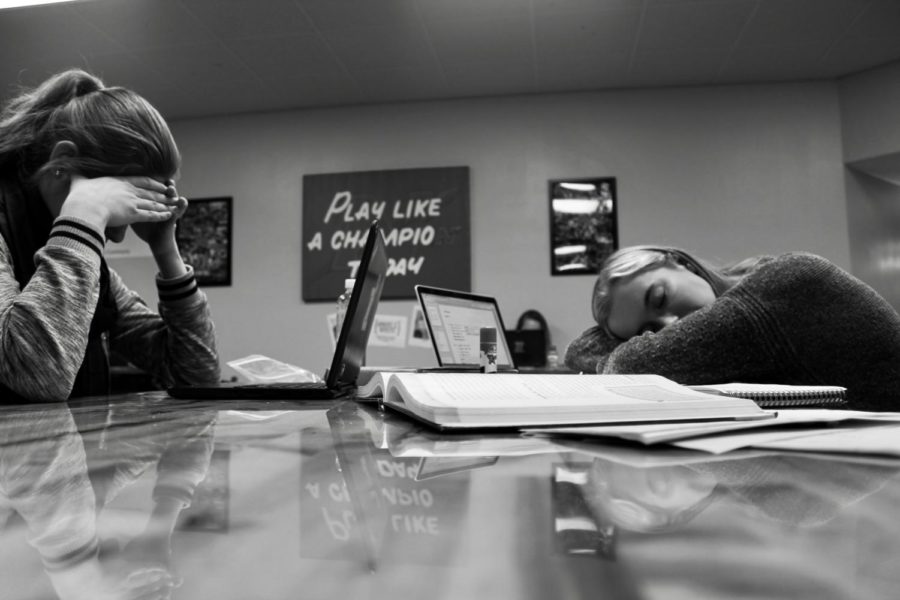Students Feel Stress, Worry and Annoyance Toward Grading Scale Shifts
Photo by: Jacob Theisen
Two seniors feeling tired and stressed.
November 25, 2017
NHS students feel skeptical about the switch to a standards-based grading scale — starting next year.
“I don’t know a lot about standards-based grading, but it sounds awful,” senior Maggie Schuster said.
Standards-based grading is a system of grading a student’s learning abilities, based on elaborate course objectives.
The standards-based grading scale, which is yet to be officially determined for NHS, is presumed to be based on a 1-3 basis. Currently, classes grading with the standardized grading method use a wide variety of grading ranges. Mrs. Amanda Hoff’s government classes use a 1-4 scale, while Mrs. Deb Gauthier and Mrs. Sara Roblee’s American Studies course utilizes a 1-10 grading scale.
In a typical classroom that has adopted standardized grading, the teacher will hand out a rubric that highlights the assignment’s core requirements. The learning targets grading rubric is laid out in the format of progressing, proficient, and advanced proficiency.
In translation, when a student strives to achieve an “A” in a class, progressing would be the worst on the grading scale and advanced proficiency would be the desired “A.”
The administration has confirmed that Neenah High School will not have standardized grading fully in place until the school year of 2019-20.
“Switching from an 80 percent summative and a 20 percent formative scale, to a target-based learning method, would act as a smooth transition to a 100 percent summative and a zero percent formative scale. This grading scale would ensure that students are focusing on their learning instead of chasing points,” Principal Wunderlich said.
Currently, tests and projects account for 80 percent of student’s final grade, whereas homework accounts for 20 percent.
For many students, the root of their educational stress is not the switch from 80-20 to standardized grading. The new grading standard is another anxiety pincher, that adds to students’ growing list of stressors.
According to the American Psychological Association, 31 percent of teens in high school feel overwhelmed, depressed and sad in their high school’s environment. Many teens admit homework is the leading stressor in their day-to-day school routine. Every night, teens spend countless numbers of hours studying for tests and accomplishing worksheets. In 2004, The University of Michigan calculated that an average American teen spends at least three hours and 38 minutes doing at-home coursework.
“Time management between outside activities and school work is very hard. I often struggle with homework. When I get stuck, I often turn to my parents or friends. I feel like my teachers will think I’m stupid or will judge me for not understanding the concepts that they have taught me,” senior Maddie Meinke said.
Stressing over homework leads students to either not completing their homework or rushing through it. Countless students state, that besides math or advanced placement classes, they finish their homework not to comprehend the material but to — get it over.
“In addition to tutorial during school, I spend at least one and a half hours every night doing homework. Depending on the subject, I tend to finish my homework for the grade,” sophomore Claire Eisele admitted.
NHS hosts over 40 clubs, in addition to seasonal sports. Extracurriculars and part-time jobs are another added nightly struggle. Participating in extracurriculars provide the opportunity for students to get involved in their school’s unique dynamic, build their college activities resume, and ultimately allows them to take a breather from the daily hustle and bustle. Other students venture to part-time jobs after school and usually do not finish work until late at night. When everything’s said and done, once again students head home to “hit” the books.
A recent study by Dr. Craig Canapari, a pediatrician that graduated from Yale, stated that 90 percent of all American teens are extremely sleep deprived. Dozens of teens run on as little as four to five hours of sleep each night; and the Center for Disease Control recommends two times that amount.
On a weekly basis, this aggravating routine tends to repeat itself. Students finish one project, study for a test, and then find that another paper or assignment is due soon. The deadlines are a never-ending spiral. Students express that homework is a nightly battle with mental and physical stress. In fear of this cycle getting worse, students are protesting standard-based learning.
“I put in so much work every night to get good grades. This system makes A’s almost unattainable, or forces you to jump over impossible hurdles to be in the “green.” For me this learning style makes my anxiety explode,” junior Emilee Wise said.
In reassurance, NHS administration is aiming for student stress levels to go down with the switch to target-based learning. The team of administrators is hoping to get students to build their learning skills, by being able to truly understand concepts that are taught to them. Administration also would like students to value their learning experience instead of chasing points.
“Our work to move toward target based learning will ensure that students are receiving every opportunity possible grow as a learner and to demonstrate their learning,” Assistant Principal Tim Kachur said.
“If you are struggling in a class, think to yourself, do you know what the learning target is? Are you listening to your teacher’s feedback? Are you taking your teacher’s advice to better your own learning? It’s very important to have good communication with your teachers, and the desire to better your learning skills,” Principal Wunderlich advised.
Administrators, teachers and the counseling team would like to note: if students are struggling in school or do feel overwhelmed, do not be afraid to ask for help. Teachers are here to help. A source or an outlet exists — one willing to take the time to promote success.


